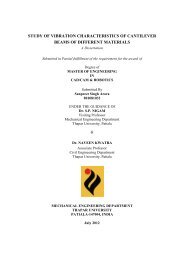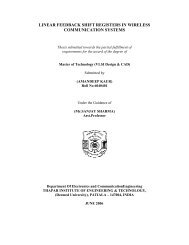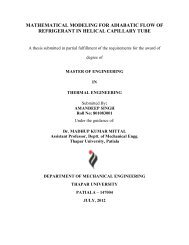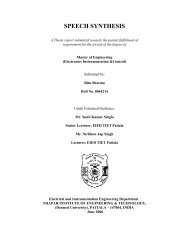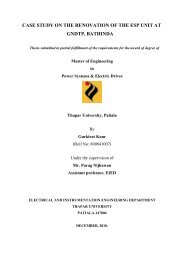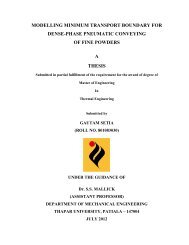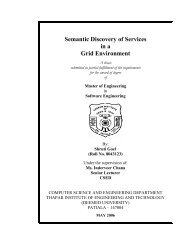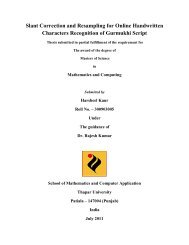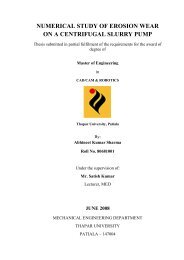from indigenous fermented foods and human gut ... - Thapar University
from indigenous fermented foods and human gut ... - Thapar University
from indigenous fermented foods and human gut ... - Thapar University
Create successful ePaper yourself
Turn your PDF publications into a flip-book with our unique Google optimized e-Paper software.
121<br />
Chapter V Discussion<br />
workers in the field (Havenaar et al., 1992; McCracken <strong>and</strong> Gaskins, 1999; Bezkorovainy,<br />
2001; Dunne et al., 2001), as well as a Joint FAO/WHO working group (Chesson et al.,<br />
2002), in vitro studies can only partially mimic the actual in situ conditions in the <strong>gut</strong><br />
ecosystem. Nevertheless, such in vitro systems are powerful tools especially for screening<br />
numerous samples.<br />
Six new potentially probiotic isolates were selected on the basis of their good survival<br />
properties under in vitro simulated stomach-duodenum passage. Further phenotypic <strong>and</strong><br />
genotypic characterization of six strains revealed two strains as L. casei (LAM-1 <strong>and</strong> LAM-<br />
2), the other two as L. delbruckeii (LKH-2 annd LKH-3), one as L. helveticus (LKH-3) <strong>and</strong><br />
one as L. fermentum (Lamec-29). These strains were further investigated for their functional<br />
<strong>and</strong> probiotic attributes. Two L. casei strains (LAM-1 <strong>and</strong> LAM-2) stemmed <strong>from</strong> mango<br />
pickle, indicating the safe origin of the strains <strong>and</strong> also the ability of these strains to survive<br />
the passage through the harsh conditions in the gastrointestinal tract. The other selected<br />
strains (two L. delbruckei <strong>and</strong> one L helvictus) were isolated <strong>from</strong> traditional beverages<br />
Kharoli <strong>and</strong> Bhaati jaanr, respectively. A previous study conducted with several Asian<br />
<strong>fermented</strong> <strong>foods</strong> such as ‘‘suan cai’’, ‘‘kimchi’’, ‘‘natto’’ ‘‘mizo’’, ‘‘Nham’’ <strong>and</strong> ‘‘Miang’’<br />
reported bioactive properties as well as the occurrence of LAB with interesting probiotic<br />
characteristics (Ramadan et al., 2005). However, pickled vegetables/fruits as well as<br />
beverages widely consumed in the Indian subcontinent especially as adjunct to main meals,<br />
have been rarely investigated for probiotic strains of LAB. Mahula liquor is prepared by the<br />
fermentation of flowers of Madhuca latifolia, claimed to have extensive medicinal properties,<br />
whereas Bhaati jaanr is made by fermenting rice. Both are extensively consumed in several<br />
rural areas of North Eastern, Eastern <strong>and</strong> Northern India.





